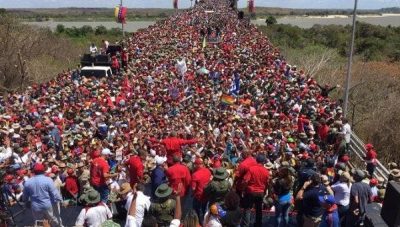Aid to Venezuela Aimed to Unseat Maduro – US Government Watchdog

All Global Research articles can be read in 51 languages by activating the “Translate Website” drop down menu on the top banner of our home page (Desktop version).
Visit and follow us on Instagram at @crg_globalresearch.
***
The Office of the Inspector General at the U.S. Agency for International Development concluded that the U.S. aid to Venezuela in 2019 was not fully allocated to the country, and it was part of a mechanism to unseat democratically elected President Nicolás Maduro. The findings, known on Thursday, belong to a report published by this office on April 16.
Titled “Enhanced Processes and Implementer Requirements Are Needed To Address Challenges and Fraud Risks in USAID’s Venezuela Response,” the report highlights that “the shipment of U.S. supplies responded in part to the Trump administration’s campaign to put pressure on Maduro rather than simply provide aid to Venezuelans in need.”
Moreover, the Inspector General Office remarked that only eight out of 386 tons of U.S. humanitarian aid reached Venezuela, with some of those goods ending up in Colombia and Somalia. This, as the U.S. Agency for International Development (USAID), allocated $2 million for this particular operation.
Likewise, a Venezuelan non-profit organization unnamed in the report received funding based on its alignments with U.S. interests despite concerns about the non-profit financial requirements.
Instead of giving #Venezuela access to its own 1.2 billions, the #UnitedKingdom is offering "humanitarian aid" for 9 million dollars. #HandsOffVenezuela pic.twitter.com/kNURT9Lril
— teleSUR English (@telesurenglish) April 12, 2019
In this sense, the report, which has examined humanitarian information for over two years, highlights that “the directive to pre-position humanitarian commodities was not driven by technical expertise or fully aligned with the humanitarian principles of neutrality, independence and being based on needs assessments.”
On the other hand, the experts remarked the contradictions of humanitarian help being politicized. One example was the aid convoy that the U.S. tried to send via Colombia, preceded by a “Venezuela Live Aid” concert sponsored by billionaire Richard Branson, which promoted Opposition lawmaker and self-appointed interim president Juan Guaido. This concert featured international artists such as Carlos Vives, Juanes, Alejandro Sanz and became a platform explicitly focused on anti-Venezuelan government messages throughout.
Furthermore, the report notices that “the verbal direction did not establish clear accountability nor did it provide justification for decision-making.” For instance, “supplies were unnecessarily shipped in huge Air Force C-17 cargo planes instead of more economical commercial options that were available.”
In addition, “ready-to-eat food to combat child malnutrition was also sent even though USAID’s experts had determined that the nutritional condition of children in Venezuela did not warrant its use at the time.”
Ultimately and upon close analysis, the report highlights that the U.S government’s goal was not to aid but rather to force the Venezuelan government to surrender to its interests.
*
Note to readers: Please click the share buttons above or below. Follow us on Instagram, @crg_globalresearch. Forward this article to your email lists. Crosspost on your blog site, internet forums. etc.
Featured image: Venezuelans marched on Angostura bridge at the border with Colombia to reject the alleged humanitarian aid on February 20, 2019. | Photo: Twitter/ @teleSURtv

